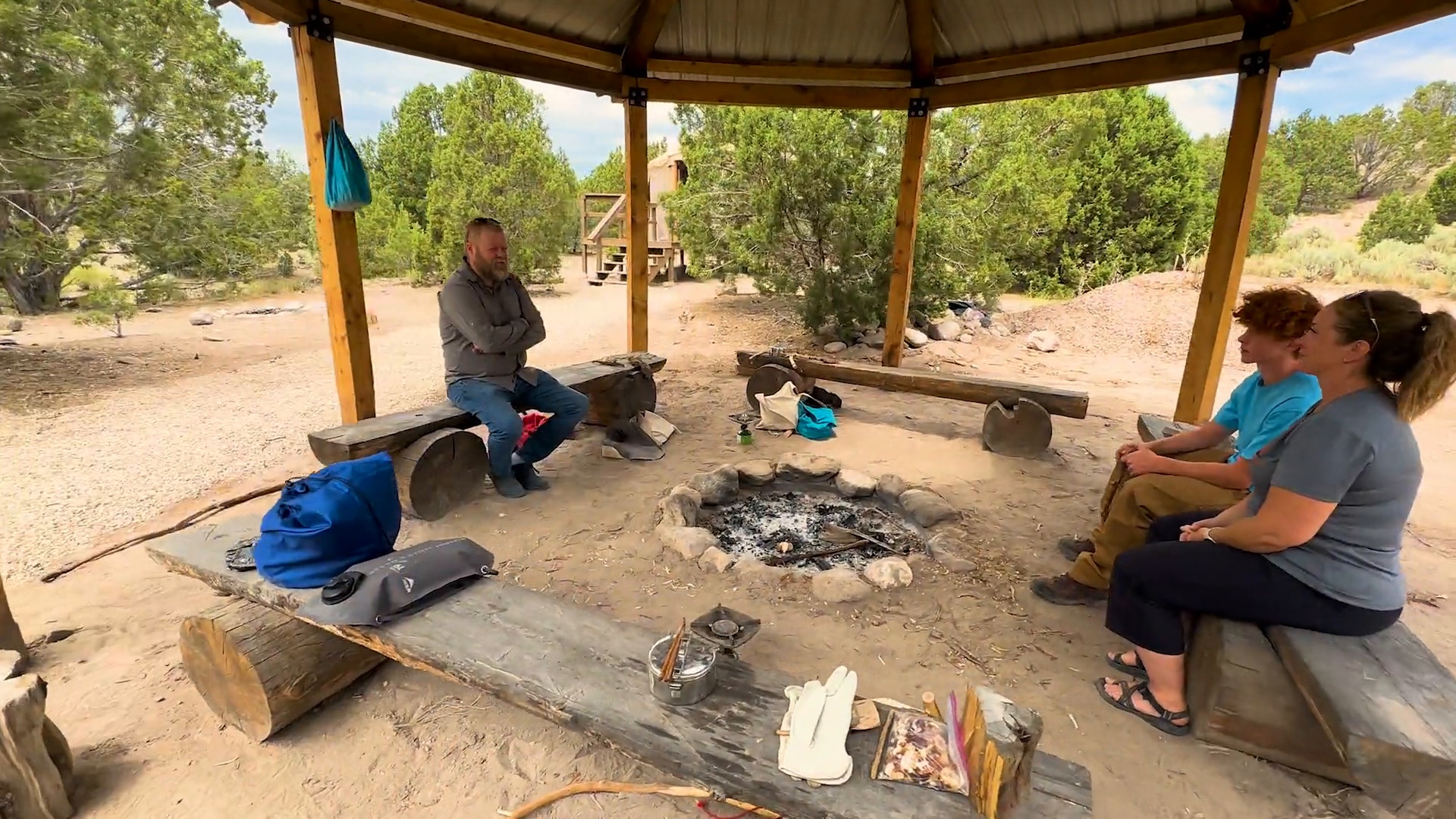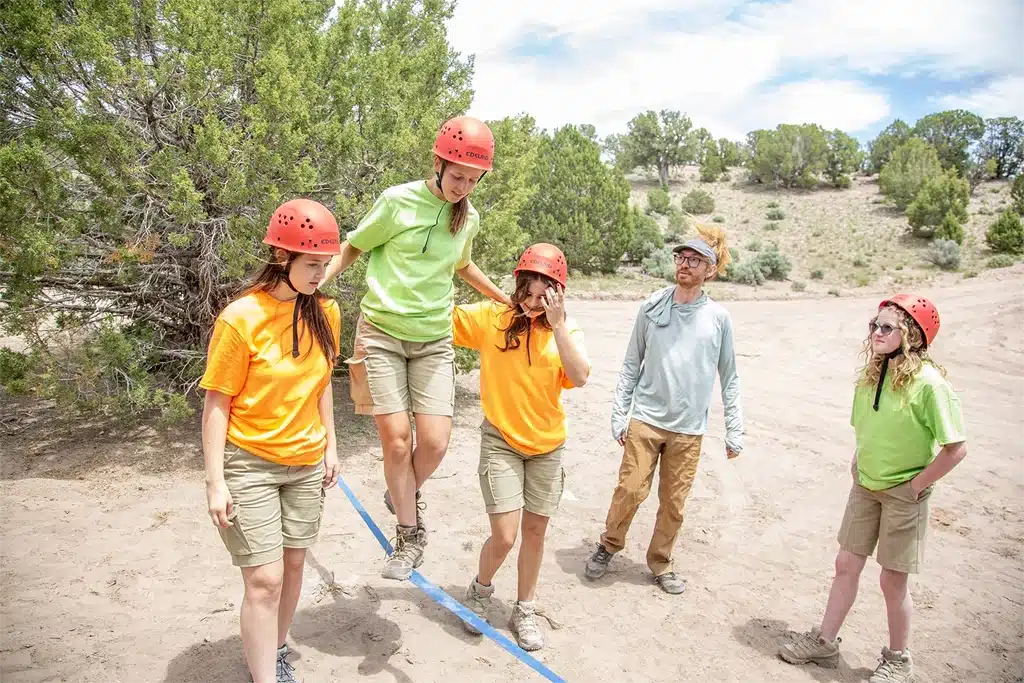
Three Peaks Ascent has a Specialized Treatment Focus for Teens
Through our unique approach to experiential and relationship-based therapy, we can effectively address a wide range of situations, such as:
- Depressive Mood Disorders
- Anxiety
- Trauma/Stress Disorder
- Family Conflict Problems
- Behavior and Anger Issues
- ADHD
- Learning and Developmental Disorders
- Autism Spectrum Disorder
- Attachment Disorder
- Anger Issues
- Grief & Loss
- Lack Of Motivation
- Lying & Manipulation
- School Refusal
- Self Esteem Issues
It's important to note that these signs can vary from teen to teen, and that not all out-of-control teens will exhibit every sign. Additionally, these signs may also be indicative of other issues or challenges that the teen is facing.

Nature-Based Short-Term Residential Treatment
Our short-term program combines therapy and nature-based activities, creating a holistic approach to address their specific needs. Led by experienced therapists, our team is dedicated to delivering individualized care for each teen.
Throughout the program, your teenager will engage in activities like hiking and camping, working alongside their therapist to overcome challenges. The simplified setting allows them to detach from daily distractions and focus on personal growth. The natural environment serves as a metaphor for their journey, translating the skills learned in treatment to everyday life.
Our program empowers teens to take ownership of their healing process and develop lasting skills for healing beyond their stay. It serves as a stepping stone towards independence rather than fostering ongoing dependence.



Benefits of a Nature-Based Short-Term Residential Treatment Program
Being immersed in nature can have a profound impact on a teenager. It improves their mental, emotional, and physical health. Combined with a proven clinical approach, our therapeutic program helps teens heal from the issues driving their out-of-control behavior. Here are specific benefits your family can expect to see while your teen is in nature-based short-term residential treatment.
The first stage of effective short-term residential treatment focuses on assessment and stabilization.
1. Assessment
By observing your teen in a novel environment, our experienced therapists gain a deep understanding of what is really happening with your child. Research indicates accurate mental health assessments can lead to a 20% reduction in the number of days in treatment.
2. Stabilization
Mental health stabilization provides a safe environment to deescalate your teen’s level of distress and/or reduce their acute symptoms of mental illness. Until teens feel genuinely safe, they cannot begin to heal. One therapeutic modality emphasizes that “Cues of safety are the treatment” and “safety is defined by feeling safe and not simply by the removal of threat.” It is not enough to merely tell a teen in crisis that they are mentally and emotionally safe, they must actually feel and believe it.
Once your teen feels safe, our nature-based residential treatment program provides a novel and challenging environment that disrupts their unhealthy patterns and behaviors. Behaviors that either:
- cause your teen's mental & emotional health struggles
- or that your teen has developed as a negative way of coping with their struggles.
The second stage of an effective residential treatment program focuses on engaging teens in the therapeutic process and empowering them with the skills needed to thrive.
1. Engaging Teens in Therapy (even if they’ve been resistant to it before)
The ThreePeaks Ascent treatment program is designed to re-engage teens in healthy adolescent development. When your teen attends a short-term residential program, they are taken away from negative distractions they may have at home. They engage in treatment in a way that would not be possible in any other setting.
Your teen will participate in individual, group, and family therapy sessions while in treatment. This allows them to process their behavior as well as make changes in their personal life and family relationships. They are also able to learn from their peers, realize they are not alone in their struggles, and gain motivation to make changes.
We've found that by the time of discharge, 90% of teens were actively engaged in treatment. When contacted six months after treatment, most of these teens maintained the motivational progress they made during treatment.
2. Empowering Teens Through Skill Development
As your teen engages in the therapeutic process, they’ll start to see huge progress. But for long-term healing, it is not enough to only alleviate your teen’s struggles, we must also empower them with the skills needed to thrive in life. These skills include:
- Self-awareness skills like a growth mindset, identifying one's feelings, developing interests & sense of purpose
- Self-management skills like emotional regulation, self-motivation, resilience, setting & achieving goals, planning & time management
- Responsible decision-making skills like showing curiosity & open-mindedness, anticipating & evaluating the consequences of one’s actions, internal locus of control
- Relationship skills like communicating effectively, seeking & offering support, resolving conflicts constructively
- Social awareness skills like showing empathy & compassion for others, taking others’ perspective, recognizing strengths in others
Your teen is powerful, intelligent, and capable. They are among the leaders of tomorrow. That is why the third stage of our short-term residential treatment program focuses on helping teens redirect their previously misused potential toward developing mastery in life.
Philosopher Friedrich Nietzsche observed years ago, “Happiness is the feeling that power is increasing—that resistance is being overcome.” When teens develop competence and mastery they:
- gain self-reliance and self-confidence
- become more resilient
- have a greater sense of meaning and purpose
- and better resist negative emotions.
Overall, building mastery helps teens develop a positive mindset. Because they feel competent and in control, they go from feeling, “I’m not capable” to “I can do this!”
You Are Not Alone
ThreePeaks Ascent is there for you and your family.
Signs Your Out-of-Control Teen May Need Treatment:
The signs of out-of-control behavior in teenagers can manifest in physical, emotional, and behavioral ways. As a parent, it's crucial to be knowledgeable of these warning signs in order to effectively support and guide your teen. The following is a list of common indicators of out-of-control behavior in teens that parents should be aware of.
Here are some common signs that a teenager may be out of control:
- Aggressive behavior or violence toward others
- Explosive anger issues
- Running away from home or repeated truancy
- Engaging in dangerous or illegal activities
- Poor academic performance or school refusal
- Negative or destructive relationships with peers
- Dangerous or risk-taking behaviors such as reckless driving or unprotected sex
- Defiant or rebellious behavior toward authority figures
- Depression, anxiety, or other mental health concerns
- Cutting or Self-harm
- Thoughts of suicide
- Withdrawal from friends, family, or activities they once enjoyed
- Unexplained changes in mood or behavior
- Poor hygiene or grooming
- Sudden changes in eating or sleeping habits
- Disrespect for authority or rules
- Lies or deceitful behavior
- Negative self-talk or low self-esteem
It's important to note that these signs can vary from teen to teen, and that not all out-of-control teens will exhibit every sign. Additionally, these signs may also be indicative of other issues or challenges that the teen is facing. If you're concerned about your teen, it's important to seek professional help as soon as possible.
Importance of Early Intervention & Treatment for Out-of-Control Teens
Early intervention is important when helping out-of-control teens because it can make a significant difference in their well-being and future prospects. Some reasons why early intervention is important include:
- Preventing negative consequences: Early intervention can help prevent negative consequences such as criminal behavior, or long-term mental health issues from becoming entrenched.
- Building resilience: Early intervention can help build resilience and coping skills in teenagers, which can help them better manage stress and challenges in the future.
- Improving outcomes: Early intervention can improve a teenager's outcomes, including their academic performance, relationships, and overall well-being.
- Addressing underlying issues: Early intervention can help identify and address underlying mental health or developmental issues, which can be a root cause of out-of-control behavior.
- Improving access to resources: Early intervention can help ensure that a teenager has access to the resources and support they need to overcome challenges and develop positive coping strategies.
- Building trust: Early intervention can help build trust between parents and their teenager, which can be critical in ensuring that the teenager is receptive to support and guidance.
Seek professional help if you're concerned about your teenager's behavior, as a mental health professional can provide tailored advice and support based on the specific needs of your teenager. Additionally, early intervention can be critical in ensuring that your teenager receives the support and resources they need to overcome challenges and reach their full potential.

Not Seeking Treatment Can Be Harmful
The short and long-term effects of leaving out-of-control teenage behavior untreated can be significant and far-reaching. Some of the most common effects include:
Short-term effects:
- Decreased academic performance
- Damaged relationships with peers, family members, and authority figures
- Increased chance of risky behavior and criminal activity
- Decreased mental health and well-being
Long-term effects:
- Increased risk of ongoing mental health issues
- Decreased life satisfaction and success in personal and professional areas
- Difficulty forming and maintaining healthy relationships
- Increased likelihood of involvement in the criminal justice system
Early Intervention Is Important For Healing Your Teen & Family
Early intervention refers to recognizing the warning signs of out-of-control teenage behavior and acting before it gets worse. When you realize that your teen is struggling, it’s important to get professional treatment before it becomes worse.
Early intervention can help parents and families of out-of-control teenagers in several specific ways, including:
- Providing support and guidance: Early intervention can provide parents and families with the support and guidance they need to navigate the situation effectively. This can include information on effective communication strategies, coping skills, and resources available to help manage the situation.
- Improving relationships: Early intervention can help improve relationships between parents, teenagers, and other family members. This can include teaching parents how to better understand and communicate with their teen while also improving the teenager's relationships with their peers and family members.
- Reducing stress for the whole family: Early intervention can help reduce stress and anxiety for parents and other family members, as well as for the teenager themselves. By receiving support and guidance, families can feel more confident and better equipped to manage the situation effectively.
- Preventing further harm: Early intervention can help prevent further harm to the teenager and the family. This can include addressing behavioral issues before they escalate and helping the teenager access the resources and support they need to overcome challenges.
- Building resilience: Early intervention can help build resilience and coping skills in parents and family members, which can help them better manage stress and challenges in the future.
- Improving overall well-being: Early intervention can help improve the overall well-being of everyone involved. By addressing out-of-control behavior early on, families can take an important step toward promoting positive mental health and well-being for all members of the household.
Plus, it could help reduce long-term medical costs and the overall burden on family and friends. Overcoming out-of-control teenage behavior is possible with the right tools and treatment programs. You can help your teen get the support they need.
Every teen’s strengths and challenges are different. Complete the no-obligation teen assessment below to help us understand your family’s needs.
We respect your privacy and will never share your information.
We’re here to help - take the first step and contact us to see if Nature-Based Short-Term Residential Treatment could be the path to healing for your family.
